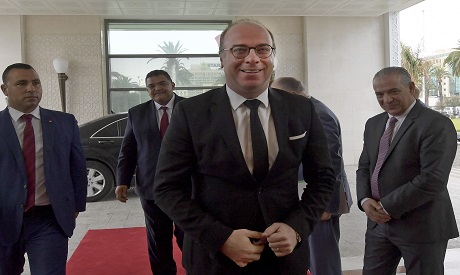
Tunisian Prime Minister Elyes Fakhfakh arrives to preside over the national conference "to establish decentralisation and local power" on July 15, 2020 in Tunis. (Photo: AFP)
Tunisia's caretaker Prime Minister Elyes Al-Fakhfakh dismissed all ministers of the Islamist Ennahda Party Thursday, one day after he submitted his resignation to President Kais Saied.
According to the official Facebook page of the Tunisian government, the ministers who lost their posts include Minister of Youth and Sports Ahmed Gaaloul, Minister of Public Works, Housing and Spatial Planning Moncef Sliti, Minister of State for Local Affairs Lotfi Zitoun, Minister of Transportation and Logistics Anwar Marouf, Minister of Health Abdel Latif Mekky, and Minister of Higher Education and Scientific Research Selim Al-Shoura.
Ghazi Al-Shouashi, Asmaa Al-Sehery, Shoukry Belhasan, Fadel Karem, Al-Habib Al-Kasho and Lobna Al-Gerebi were appointed as ministers of housing, youth and sports, local affairs, transportation, health and higher education respectively.
One day earlier, Wednesday, Al-Fakhfakh was still the North African country's head of government, voted for by parliament five months ago. But he earned caretaker status after he submitted his resignation to Saied in light of a political crisis with Ennahda.
The process of finalising the lineup of Al-Fakhfakh's coalition took roughly four months after Tunisia held parliamentary elections in October 2019. Al-Fakhfakh's Thursday move means that as long as no new head of government and list of ministers is agreed upon by Tunisia's political forces, and approved by parliament, Ennahda will continue to lack representation in the ruling coalition government.
Ironically, no other party has more seats than Ennahda (52 seats) in the 217-seat Tunisian parliament.
On Tuesday, Ennahda said it will push for a vote of no confidence against Al-Fakhfakh after he decided to reshuffle the cabinet. Ennahda, which both Al-Fakhfakh and Saied opposed, wanted consultations over selecting a new head of government and including new political forces in the coalition government, such as Qalb Tounes Party.
The Islamist party argued that Tunisia needs a better balance between its government and parliament.
But the change that Ennahda wanted in the structure of the coalition government would eventually mean less cabinet representation for anti-Islamist forces. Moreover, opposition parties did not welcome including Qalb Tounes in government as its leader and former presidential candidate Nabil Karoui has corruption allegations against him.
As a result, Ennahda announced it will seek a vote of no confidence against Al-Fakhfakh. The motion against him has reportedly secured the 109 votes required for parliament to pass it. Political sources told Reuters that Saied asked Al-Fakhfakh, who is also currently facing accusations of conflict of interest, to leave office.
These developments coincide with attempts by the opposition to arrange a vote of no confidence against Rached Al-Ghannouchi, Ennahda's leader and speaker of parliament.
Parliamentary sources in Tunisia, the satellite TV channel Al-Arabiya reported Sunday, said that political forces were “fed up with Al-Ghannouchi’s suspicious moves and practices,” including his “attempt to implement the Muslim Brotherhood agenda” in Tunisia, accusing him of seeking to expand his authority by disregarding the president.
These forces are willing to hold a vote of no confidence against Al-Ghannouchi, believing that a conflict of interest exists between Al-Ghannouchi’s roles as Ennahda’s leader and speaker of parliament. They include Al-Kotla Al-Democrateya Party (40 MPs), Tahya Tounes, Al-Islah Al-Watani (15), Al-Kotla Al-Wataneya (nine) and the Free Destourian Party (17).
Tensions between Ennahda, one of Tunisia's key political parties after the 2011 revolution, and opposition forces have contemporary roots. Seven years ago, in talks that were brokered by the Tunisian General Labour Union, the then Ennahda government stepped down and handed power to a transitional government till new elections were held. This political crisis followed the assassination of two opposition leaders, Choukri Belaid and Mohamed Brahmi.
Short link: